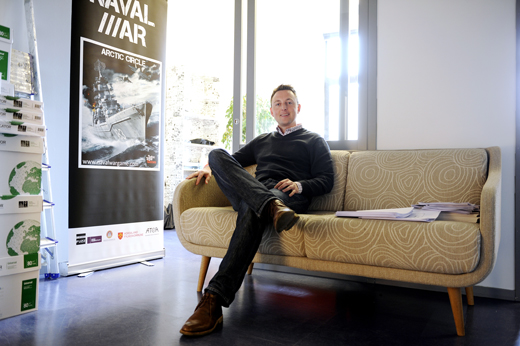A career 'møst'
For a while, Lars Leegaard Marøy, managing director of Fuzz AS, was involved in the world of international politics because of a naval war strategy game Fuzz had invested in. He has also been studying management control for two years. In Norwegian
25.06.2012 - Sigrid Folkestad (translated by Silje Gjerde/Allegro)
While Lars L Marøy and the rest of his group in the Executive MBA programme in Management Control (MØST) were reading their syllabus and writing their theses, the Russian foreign minister was furious because of a naval war game that Marøy and the investment company Fuzz had supported financially.
War at sea
Two years ago, Fuzz invested in the game Naval War Arctic Circle, which was developed by the Bergen-based company Turbo Tapes Games. The state-owned Norwegian Film Institute also provided funding for the game, and when the Russian foreign minister discovered this, he interpreted it as Norway funding a game in which Russia was cast as the enemy. Allegedly, he told Norwegian Minister of Foreign Affairs Jonas Gahr Støre that Norway ought to withdraw the funding.
'Initially, the developers cooperated with the Norwegian Navy, but relations deteriorated as a result of the foreign policy conflict. I've heard that no guests from Haakonsvern naval base would be allowed to attend the launching of the game, at least not in uniform,' says Lars L Marøy.
According to the EMBA student, working with the game developers was a useful experience.
'Norwegian film producers think: "Let's make a film for the Norwegian market - the foreign market is a bonus." Game developers think: "Let's make a game for the world - Norway's not that important to us." We have learned a lot from the game developers that we can make use of in new film projects.'
A year ago
When NHH Bulletin spoke with the group of Management Control students last year, they were working on the basis of a hypothesis that private cinemas earn more money (than publicly owned cinemas) because they show more commercial films, and because they are bigger and can take advantage of economies of scale. Gradually, Marøy, Anette Tveiterås Hjeltnes from Ulvik and Christiane E Skage from Flekkefjord found out that their hypothesis was wrong.
'The films screened at private cinemas are not very different from those shown at public cinemas. The point is that a huge proportion of the turnover comes from a small number of films, the top 20 to 40 films, and that they are shown everywhere. If a cinema also shows an obscure Rumanian film, it doesn't affect profitability to any noticeable extent.'
The group found that the most important difference is that private cinemas have lower pay and pension costs than municipal cinemas.
'It turned out that the private cinemas were more profitable primarily because they had fewer employees and employed more students and other cheap labour. What's more, the private cinemas do not have to comply with public sector collective agreements regarding pensions and extra pay when films are shown after ordinary working hours, which is normally the case.'
Top grade
The thesis, which was awarded an A, is subject to a restricted access clause, and the students cannot divulge details and confidential business information. When asked whether the private cinemas are more well run, Marøy responds:
'What is a cinema's job? To show films or to generate profit for its owners, the local authority or private players. Regardless of what standpoint you take on this issue, we believe that cinemas should be run as cost-efficiently as possible. Although our thesis shows that private cinemas earn more than publicly owned ones, that does not mean that we have become supporters of privatisation. But we believe that municipal cinemas can do a lot to improve their profitability, and that the difference between municipal and private cinemas doesn't have to be so big.'
'Could you have performed such analyses before the Management Control programme?'
'I wouldn't have stood a chance. First of all, the thesis required a lot of analysis of financial statements. We have looked at how cinemas are run, we have identified value and cost drivers, analysed pay and pension conditions, ownership structures and financial income, and looked at cross sales with kiosks and pricing models.'
Marøy believes that the advantage of the Management Control programme is that that it offers a comprehensive approach to the discipline of economics.
'The learning curve, which started so steeply almost two years ago, is still just as steep.'
'At what price?'
'I have been very busy, especially in connection with meetings, exams and papers. I could probably have done it again, but not with the same wife,' Marøy laughs.
'Is the study programme important in relation to your job?'
'The Management Control programme has made me a better manager, and I will go as far as to say that we are already noticing a difference in Fuzz's financial performance. At the same time, an MBA from the Norwegian School of Economics opens new career doors in future. That has definitely been an additional motivating factor for me.'

Lars L. Marøy at the Fuzz office at Verftet, Bergen.
Foto: Helge Skodvin
This article was published in NHH Bulletin number 2-2012
|

